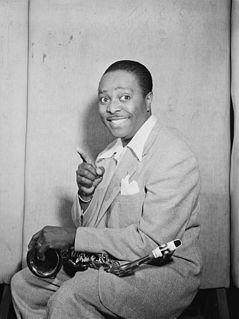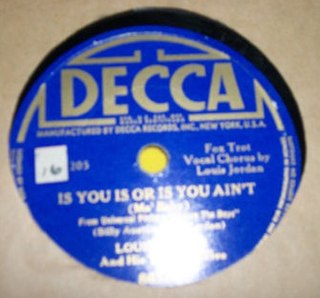
Louis Thomas Jordan was an American saxophonist, multi-instrumentalist, songwriter and bandleader who was popular from the late 1930s to the early 1950s. Known as "The King of the Jukebox", he earned his highest profile towards the end of the swing era. He was inducted into the Rock and Roll Hall of Fame as an "early influence" in 1987.
Jump blues is an up-tempo style of blues, usually played by small groups and featuring horn instruments. It was popular in the 1940s and was a precursor of rhythm and blues and rock and roll. Appreciation of jump blues was renewed in the 1990s as part of the swing revival.

"Is You Is or Is You Ain't My Baby" is a song written by Louis Jordan and Billy Austin. The song's first recording, by Jordan, was made on October 4, 1943. It was released as the B-side of a single with "G.I. Jive" with the title "Is You Is or Is You Ain't ". The song reached No. 1 on the US folk/country charts, number two for three weeks on the pop chart, and number three on the R&B chart.

"Caldonia" is a jump blues song, first recorded in 1945 by Louis Jordan and his Tympany Five. Although credited to Fleecie Moore, his wife at the time, Jordan is the actual songwriter. The song was a hit for Jordan as well as several other musicians.
"Let the Good Times Roll" is a jump blues song recorded in 1946 by Louis Jordan and his Tympany Five. A mid-tempo twelve-bar blues, the song became a blues standard and one of Jordan's best-known songs.

"Don't Worry 'Bout That Mule" is a song attributed to Charles Stewart, William Davis, Duke Groaner, and Fleecie Moore. It was performed by Louis Jordan and his Tympany Five, recorded in July 1945, and released on the Decca label.

"Blue Light Boogie" is a song written by Jessie Mae Robinson and Louis Jordan. It was performed by Louis Jordan and his Tympany Five, recorded in June 1950, and released on the Decca label. On the original 78 record, the song was divided into two parts with part 1 on the "A" side and part 2 on the "B" side.

"Texas and Pacific" is a song written by Jack Wolf Fine and Joseph E. Hirsch. It was performed by Louis Jordan and his Tympany Five, recorded in October 1946, and released on the Decca label. The song describes a rider's experience on the Texas & Pacific Railway. The "B" side of the record was "I Like 'Em Fat Like That".

"Jack, You're Dead" is a song written by Dick Miles and Walter Bishop. It was performed by Louis Jordan and his Tympany Five, recorded in October 1946, and released on the Decca label. The song describes a man's physical state if he fails to respond to romance.
Louis Jordan was an American popular music innovator who recorded from the 1930s until the 1970s. During the 1940s, he was the most popular recording artist of the soon-to-be-called rhythm and blues music. Jordan had eighteen No. 1 hits, which places him as the third most successful singles artist in Billboard R&B charts history. His 1946 recording of "Choo Choo Ch'Boogie" is tied for second place for spending the most weeks (eighteen) at No. 1. Jordan's success was not limited to the R&B market — he also had No. 1 hits on the Billboard Pop and Country charts.

"What's the Use of Getting Sober " is a song written by Busby Meyers, performed by Louis Jordan and his Tympany Five, recorded in July 1942, and released on the Decca label. The "B" side of the record was "The Chicks I Pick Are Slender and Tender and Tall".

"Run Joe" is a calypso song written by Joe Willoughby, Louis Jordan, and Walt Merrick. It was performed by Louis Jordan and his Tympany Five with vocal chorus by The Calypso Boys. It was recorded in April 1947 and released on the Decca label. The "B" side of the record was "All for the Love of Lil".
Billboard Most-Played Race Records of 1947 is a year-end chart compiled by Billboard magazine ranking the year's top race records based on the number of times the record was played on the nation's juke boxes.Billboard assigned point totals to each record based on its juke box plays.
Billboard Most-Played Race Records of 1946 is a year-end chart compiled by Billboard magazine ranking the year's top race records based on the number of times the record was played on the nation's juke boxes.Billboard assigned point totals to each record based on its juke box plays.

"Salt Pork, West Virginia" is a song attributed to Fleecie Moore and William J. Tennyson Jr., performed by Louis Jordan and his Tympany Five, and released on the Decca label. It peaked at No. 2 on Billboard's race record chart and remained on the chart for 15 weeks. It ranked No. 8 on the magazine's list of the most played race records of 1946.

"Beware" is a song attributed to Morry Lasco, Dick Adams, and Fleecie Moore. It was performed by Louis Jordan and his Tympany Five, recorded in January 1946, and released on the Decca label.

"That Chick's Too Young to Fry" is a song written by Tommy Edwards and Jimmy Hilliard. It was performed by Louis Jordan and his Tympany Five, recorded in January 1946, and released on the Decca label. The record's "B" side was "Choo Choo Ch'Boogie".

"Reconversion Blues" is a song attributed to Steve Graham and Fleecie Moore. It was performed by Louis Jordan and his Tympany Five, recorded in October 1946, and released on the Decca label. The record's "B" side was "Salt Pork, West Virginia".

"Don't Burn the Candle at Both Ends" is a song written by Benny Carter, Irving Gordon, and Louis Jordan. It was performed by Louis Jordan and his Tympany Five, recorded in December 1947 and released on the Decca label. The "B" side of the record was "We Can't Agree".














